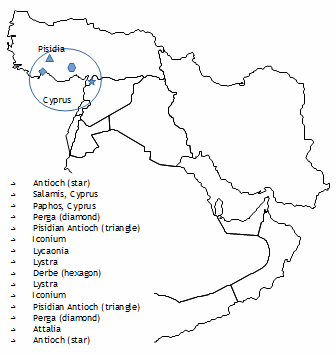Acts 13; 14
Outline
13:1-3 | Prophets in Antioch; Saul and Barnabas set apart by the Holy Spirit
13:4-12 | S & B travel to Salamis and begin preaching; Saul begins to be called Paul;
Elymas (aka Bar-Jesus), a Jewish false prophet and magician, is blinded
for a time for hindering the gospel
13:13-16a | P & B travel to Perga; John Mark returns to Jerusalem;
Paul preaches first in the synagogue
13:16b-41 | Paul’s Sermon
v16b-25 – OT background for Jesus and John the Baptist
v26-41 – Jesus is the Messiah/Christ, fulfilling the OT prophecies
13:42-43 | People want Paul to preach again the following week
13:44-47 | Paul is opposed by some of the Jews
13:48-52 | Paul turns to the Gentiles, who greatly rejoice
14:1-7 | Paul and Barnabas in preach Iconium, then flee to Lystra
14:8-18 | Paul and Barnabas thought to be gods because of miracles
14:19-23 | Paul is stoned, he and Barnabas leave for Derby and establish a church
14:24-28 | The return trip to Antioch and reported on the trip
Reflections
This is the first recorded missionary journey of Saul/Paul and Barnabas to the Gentiles. It is limited in scope, covering cities on Cyprus, where Barnabas was originally from, and some cities located in southern and central Asia Minor, what is modern day Turkey (see map below).
Here we see Paul develop his methodology of presenting the gospel in the cities where he travels to: first presenting the message to the members of the synagogue and then to the Gentiles. In this passage we find Paul’s first sermon presented to a synagogue in Pisidian Antioch. In it he reviews the history of God’s preparing the way for John the Baptist and Jesus, the Messiah. He then shows how Jesus was the fulfillment of the Old Testament prophecies concerning the Messiah. This stirred up great interest in the group.
The anticipation of hearing Paul speak again the following week had the city in an uproar and however the Jews didn’t want to accept the message that Paul was presenting. So Paul announced that he would take his message of salvation to the Gentiles instead, which resulted in much rejoicing on their part.
However, the Jews began to incite the people against them and to persecute Paul and Barnabas. So, Paul and Barnabas “shook off the dust of their feet” (see Jesus’ instructions to the disciples in Matthew 10; Mark 6; and Luke 9) and left for Iconium. They continued traveling on through the region visiting the cities of Lycaonia, Lystra, and Derbe, all the while proclaiming the good news.
After preaching the gospel in those cities, they backtracked through the same towns, until they returned to Perga, where they then moved to Attalia and sailed to Antioch, where they originally began their journey.
All the while they faced persecution and at one point Paul was even stoned and left for dead outside of Lystra. However the next day he and Barnabas were able to travel to Derbe.
On the return trip, Paul went about appointing elders in the new churches and encouraging the disciples who had been first hand witnesses of the persecution that was to come.
Upon returning to Antioch, the team related all the events which happened to them and what God had done with them on their journey by “opening a door of faith to the Gentiles.” They then spent a long time in Antioch being refreshed in their fellowship.
Even though Paul had already been preaching the gospel in Antioch and in other places, this was truly the beginning of his ministry to the Gentiles as announced to him by Jesus on the road to Damascus and confirmed by the Holy Spirit in Antioch.
We all have a role to play in the proclamation of the gospel. Not all of us are like Paul and have Jesus personally appear before us and tell us what our ministry will be. But that shouldn’t keep us from announcing the good news of God’s love and grace to others around us. Just as Paul and Barnabas returned to each of the cities and encouraged the new disciples, we too can encourage fellow believers to hold fast to their faith and not lose heart.
Lord God, give us the courage we need to share the message of Your love to the people around us and encourage us through Your Spirit and our fellow believers to never lose hope, no matter what may come. May Your will be done on earth as it is in heaven, in Jesus’ name. Amen.

Acts_13-14_RL_TheFirstMissionaryJourneyToTheGentiles.pdf


